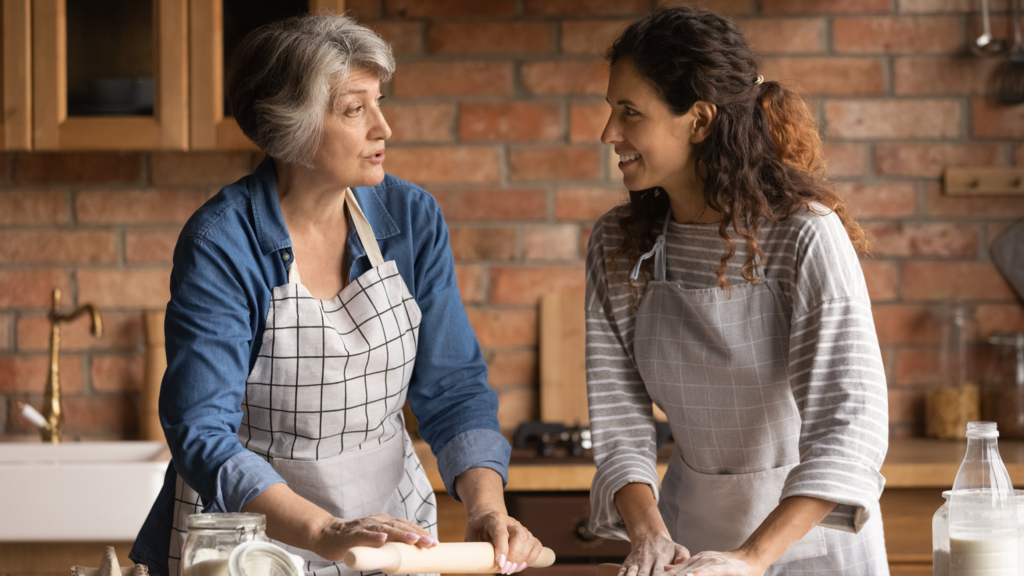Ashlee Cordell is a Research Assistant at Benjamin Rose Institute on Aging
We join together over food. Favorite dishes are deeply ingrained in memory. Flavors, textures and aromas combine time and again to create meaningful sense memories. Preparing meals brings up reminders of happy times, whether from holidays or singular meals. Foods are specific to culture and tradition and they can hold lifelong meaning. Cooking with your loved one can be about much more than simply whipping up something to eat. It can engage you both in physical, psychological and social ways, and this can be especially important for older adults.
Cooking can benefit your older loved one in the following ways:
- It activates the senses.
All five basic senses are stimulated by the act of preparing food:
- Sight: If a food is visually appealing to your loved one, he or she may be more likely to eat it. The food’s size, shape and color tend to be noticed before anything else.
- Smell: When you chop, stir, mix, blend, bake, broil or sauté, it releases a world of aromas, from subtle to intense. The way a food smells—whether it’s citrusy, spicy, garlicky, smoky, sweet, etc.— plays a major role in deciding its flavor.
- Hearing: Your kitchen fills with sounds like sizzling, crunching or bubbling as you cook and these sounds can also influence how your loved one reacts to the foods being prepared.
- Taste: As with aromas, specific foods have specific tastes (bitter, salty, sour, sweet, umami) – and they run the gamut of intensity.
- Touch: The way a food feels also plays into its appeal. Textures—whether crispy, creamy, lumpy, smooth, sticky, chewy or crumbly—are keenly felt in the mouth and on the hands and fingers. Touching food is important in determining its temperature, as well. Your older loved one may have varying reactions to touching food with skin vs. with the tongue.
- It has therapeutic value.
Your loved one’s five basic senses have a strong connection to memory and senses that are familiar and pleasurable have been shown to reduce stress. Pouring attention into making a meal, with the detail and repetitive actions that are necessary, can even have a meditative effect. Happy memories of specific meals can have particularly important benefits to older adults who live with dementia. Cooking with family and friends can boost mood and overall well-being, and is a great creative outlet. Your loved one may even have the urge to venture beyond recipes and experiment with his or her own dishes, using favorite ingredients.
- It brings people together.
Holidays and special occasions tend to revolve around food, and cooking together can be a wonderful channel for sharing memories and storytelling. Your loved one may have cherished memories of big family dinners, and recreating these can be an excellent way to strengthen bonds or form new ones. When family members cook together it’s also an opportunity to share family recipes and traditions with those who are younger. Eating the meal is a fun time to talk, learn, and simply enjoy loved ones around the table.
- It stimulates appetite.
Many older adults experience a decrease in appetite. When you cook together, your loved one may gain a greater feeling of control over what exactly is going into his or her body. When the senses are engaged from the actions involved in cooking, your loved one’s appetite may actually be stimulated, and the meal will become something to look forward to.
Food is a powerful tool for supporting good health, and preparing your own meals is an excellent means of improving upon your knowledge of food. To learn more about the benefits of eating healthily as we age, visit MyPlate – a current nutrition guide published by the U.S. Department of Agriculture’s Center for Nutrition Policy and Promotion. You may also want to look into Meals on Wheels programs, which are available for older adults who are unable to cook on their own. Visit the Meals on Wheels America website to locate a program near you.






